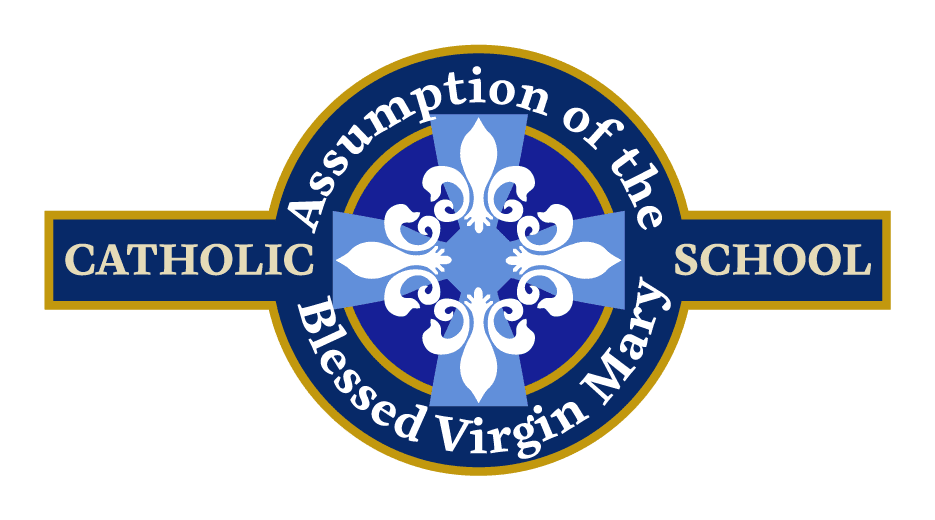At Assumption Catholic School, we want students to discover what ignites their soul and their God-given purpose. We believe the best way to discover this is through prayer and hands-on experiences. We also believe that religious education and prayer are the foundation to any great life of service and success. Our academic schedule includes time for prayer, mass, service and helping others. ABVM also offers learning support, guidance programs to ensure that our students succeed in all that they do.
Mathematics
Sixth grade students solidify the algorithms and applications of the four operations of adding, subtracting, multiplying and dividing five types of numbers; whole numbers, decimals, fractions, mixed numbers and integers. Sixth grade math students will also be able to solve one and two step equations, set up and use proportions to solve for unknown values in real world situations, and solve a variety of percent problems.
Seventh grade objectives center on the skills, properties, uses, and applications of pre-algebra, pre-geometry, and applied arithmetic. Seventh grade students focus on graphing linear equations, solving multiple-step equations, using properties to justify measures of angles in polygons and intersecting lines, as well as applying decimals, fractions, and percentages to solve multiple-step real world problems.
Eighth grade students take a full year of Algebra I. Students write, solve, and graph multiple forms of linear equations as well as systems of linear equations for real-world situations. Students also write, solve and graph absolute value, exponential and quadratic functions in everyday applications.
Social Studies
Through the lens of Catholic social teaching, sixth grade students study geography, history, government, and economy of Western Hemisphere regions. Students in seventh grade analyze world history beginning with the earliest civilizations of Babylon and Nineveh in Mesopotamia, as well as the ancient civilizations that followed throughout the Eastern Hemisphere.
Eighth grade social studies centers on turning points of American History including the founding of the United States of America, the writing of the Constitution, and American domestic and foreign policies between the Declaration of Independence and the beginning of the Civil War. Students analyze a government of the people, by the people, for the people using the foundation of our Catholic moral and ethical obligations as well as our civic rights and responsibilities as citizens.
Science
Newton’s Three Laws, magnets, physics, Next Generation Science Standards, Science Olympiad, cell projects, and a purposeful integration of STEM (science, technology, engineering, math) are all blended within the study of the sciences. Periodic Table, atomic structures, elements/compounds/mixtures, weather, earth science and many more essential topics are explored through hands-on experiments and learning in the new Science Lab.
Religion
Significant areas of study include the Old Testament, New Testament, Catholic Social Teachings, and Sacramental Preparation. Catholic doctrine is more closely studied in preparation for Confirmation. Prayer is a daily, inspirational practice intentionally interwoven continually in the schedule. The Merican Test is administered each year to promote the independent study of Catholic doctrine. Theology of the Body is a rich faith experience used in grades seven and eight.
English/Language Arts
Reading
Students examine of a variety of novels and informational texts that support cross curricular topics and also nurture individual motivation. Learners also closely analyze content and author’s craft of writing a piece of effective and engaging text. Both research and informational text are blended with creative projects.
Writing
Three primary pieces of writing include narrative, informational or explanatory, and argumentative. Many examples are examined while creating student writing projects. Students are also encouraged to enter writing contests for publication. In addition, student work is submitted to additional print and digital publications in hopes of publishing. Comparative writing, mythological projects, mystery projects and geocache /orienteering directions are additional writing experiences.
Language
Grammatical Structures and Vocabulary Acquisition are interwoven throughout cross-curricular content and through use of a rigorous academic word set. Extending vocabulary is essential to comprehension.
Speaking Listening
Students collaboratively discuss, present, and evaluate presentations. Multimedia tools are incorporated. The Eighth Grade Riverwalk Field Guides create their capstone, outdoor, environmentally focused presentations each year to facilitate the Salmon-in-the-Classroom release into the Rogue River for each grade.
Assessments
Standardized assessments are one tool used in our Catholic schools to monitor academic progress. These are considered to be one data point among many that inform us about a student’s progress. We recognize that students learn at unique rates – not every student learns to accomplish the same goal on the same day as others. We strive to find the just-right learning pace and path for each student and meet that student where s/he is academically. Given this recognition, we know that a standardized assessment is simply a snapshot of where that student is in his/her understanding on that date.
Our school uses the NWEA in order to monitor student learning.
